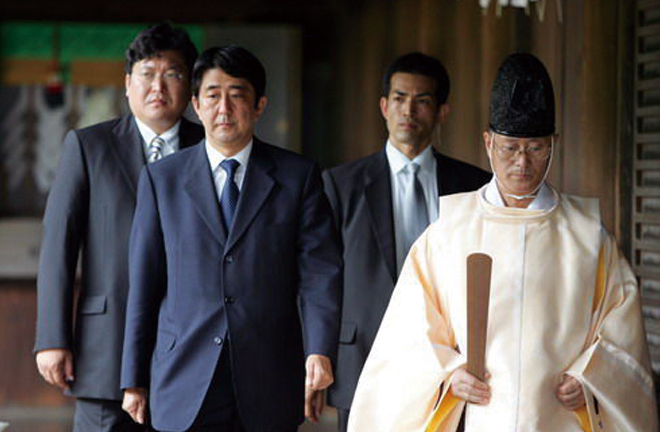Japan slammed for glossing over war crimes

Japanese Prime Minister Shinzo Abe visit the Yasukuni Shrine
July 7 marked the 78th anniversary of the beginning of the full-scale war of aggression Japan waged against China. On this occasion, Chinese scholars called for vigilance against Japanese conservatives' attempts to deny and gloss over their country's World War II (WWII) atrocities.
Liu Yongjiang, a professor from the Institute of Modern International Relations at Tsinghua University, said it is understandable that Hiroshima and Nagasaki, as the only two cities in human history hit by atomic bombs, built relevant memorials and archives to deplore the use of nuclear weapons and treasure peace as desired by mankind.
However, Hiroshima is also home to a memorial honoring its history as a "naval port" for Japan's aggression starting with the First Sino-Japanese War (1894-95). Furthermore, the Yasukuni Shrine and WWII soldier cemeteries and memorials throughout the country are also sources of controversy.
"Japan has destroyed lots of evidence of its aggression, but it cares very much about keeping the memory of its victimhood alive," said Shi Guifang, a professor from the School of History at Capital Normal University.
There are more than 200 peace museums and war archives in Japan. The establishment of war memorials and archives reflects the Japanese government's intention to deliberately play down its history of aggression, since most are touted as peace memorials or archives with the word "war" omitted, Shi said.
WWII memorials and archives in Japan are mostly managed by the government or by industry associations. Open to the public and requiring small admission fees, they have become part of Japan's "history education." This education, however, doesn't present historical truths. Rather, it reflects an attempt by Japan to whitewash its aggression during WWII, scholars said.
Ling Xingguang, a research fellow from the Institute of World Economics and Politics at the Chinese Academy of Social Sciences, said the word "defeat" is absent in Japan's official version of its WWII history, and “the end of the war" is used instead.
"Postwar Japan has been denying its defeat to its people and Asia in order to satisfy its delusion, but the system is unlikely to be sustainable now," Ling said, citing Japanese scholar Shirai Satoshi in the book On Everlasting Defeat (2013).
Zhang Junrong is a reporter at the Chinese Social Sciences Today.

 PRINT
PRINT CLOSE
CLOSE